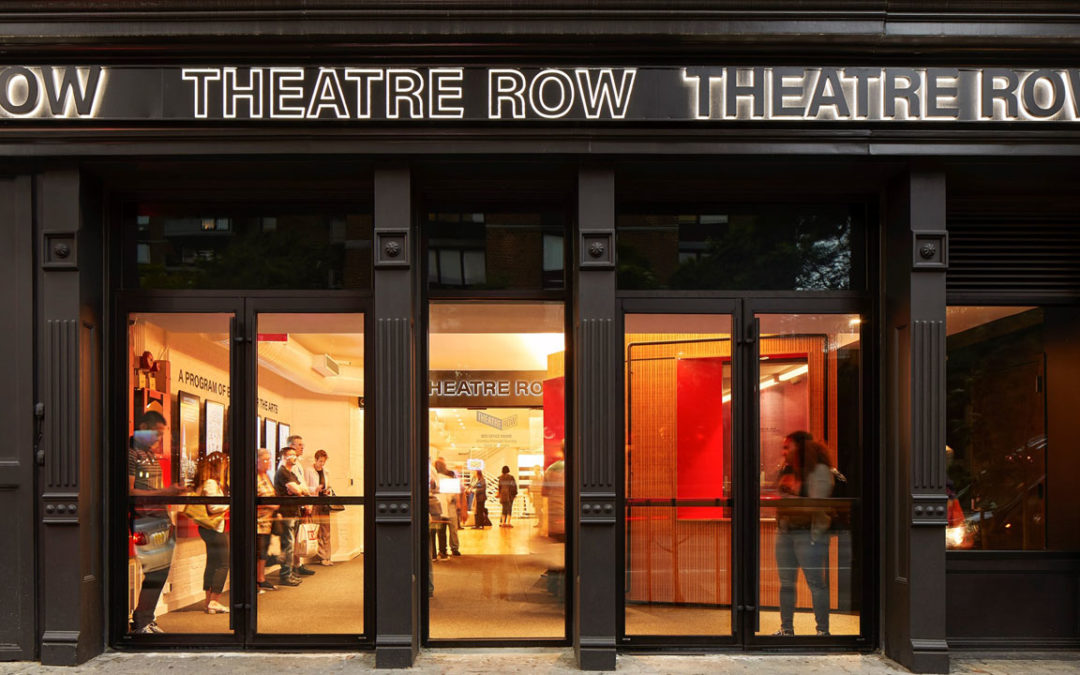
by Robert Bowie, Jr. | Jun 14, 2022 | Man Machine, Personal, Plays
I opened the New York Times last week and turned to the theater section and read the headline:
“Dear Evan Hansen’ and ‘Tina’ to End Their Broadway Runs
“The musicals, both of which lost steam after the pandemic shutdown, will close in late summer.”
The article pointed out that before the pandemic Evan Hansen was making $1 million a week in sales but now, because of Covid, successful plays were again falling by the wayside. Tina, about the life and music of Tina Turner also had been doing very well.
Over the last two years, as I watched New York theaters close and reopen and struggle to sell tickets, this kind of news had become the soundtrack of my life. I was used to it by now.
I turned to check my email and noticed an email from Mind the Art Entertainment (MTAE), the producers for my play The Grace of God & the Man Machine, scheduled to open off-Broadway on November 21. It read:
It is with great sadness that I announce that I, as Founder and Resident Artistic Director of Mind The Art Entertainment, have formally submitted a recommendation to our Board to close our company after 15 years.
Producing in NYC is no longer viable for us after so many losses related to the pandemic, including 6 cancelled/closed back to back productions.
This can not be happening!
Almost two years after the remarkable success of a Onaje — my 90-minute one-act at FringeNYC in October of 2018 — after MTAE became its producer, and after several rewrites and three professional table reads lead by dramaturg/ director Kevin R. Free, we had a two-act play with an explosive finish. It ran fast and smooth like a river to a waterfall. We were ready.
Then, after that last table read in March of 2020, the pandemic hit and we all had to wait but we were ready.
In October of 2021, we were surprised and blessed to be offered a virtual trial performance directed by Van Dirk Fisher at the Reliant Theater, who was doing cutting-edge online productions to expansive theater-starved online audiences. It was well received.
We were so ready and this play was perfect for the politics of its time. Its time was now.
Early this year, it appeared that New York theater was opening up, and MTAE booked Theater Row for November to open a week-and-a-half after the midterm elections. That would be perfect.
Now, after almost four years of anticipation and preparation, we have a road-tested redemptive two-act play, rich with true American characters, timed to be performed in November after the midterm elections, but Covid variations were again on the rise.
And just like that, it is over.
The producers sent heartbroken apologies to everyone and have even offered to transfer the off-Broadway lease at Theatre Row free to support a new producer, but it will be next to impossible to mount the play unless a new team is in place by the end of this month.
Yes, I am heartbroken.
But throughout my whole life, I have been blessed by the opportunity provided by crossroads and disasters.
If you are a professional producer for New York theater, or if you know someone who is, just let them know I’m not dead yet and I would be happy to send them the script — but two weeks may not be enough time. (You can click the Contact link in the menu.)
Yes, I know it is almost impossible. But as Hamlet says, “the readiness is all.”
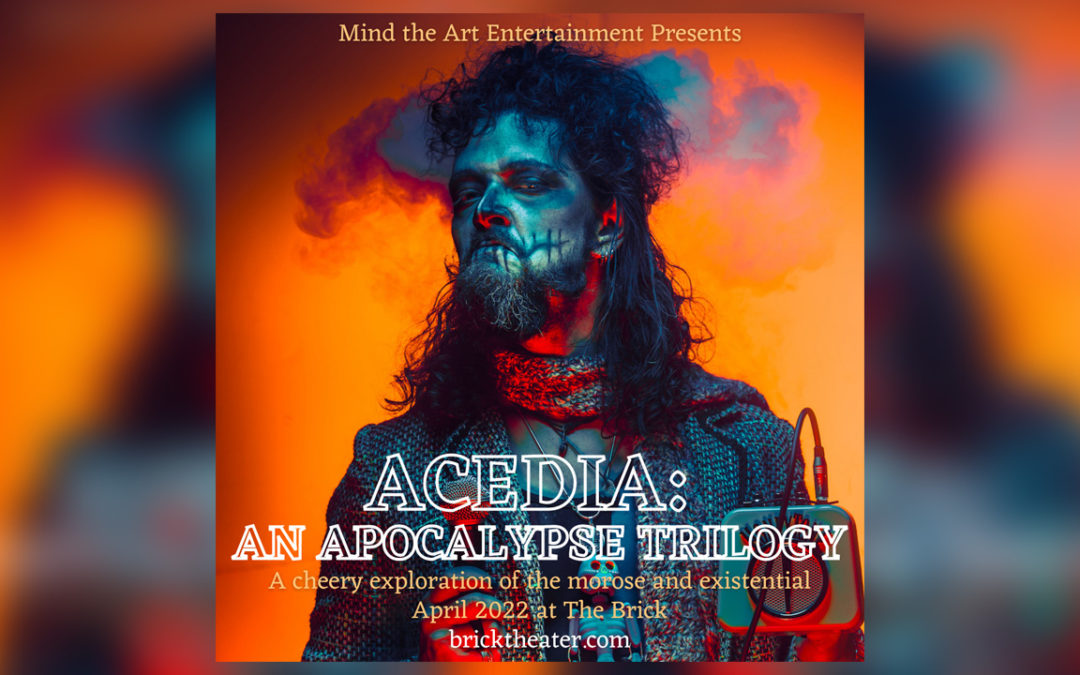
by Robert Bowie, Jr. | Mar 29, 2022 | Operetta, Plays
Friends, this week I’m featuring an upcoming NYC production I’m excited about, which was written, composed, and produced by my dear friend Christian De Gré Cárdenas, and co-produced and directed by Brian Freeland:
On April 13, Mind The Art Entertainment (MTAE) is opening ACEDIA Part 1, Part 2, and Part 3, which run until April 30th at the Brick Theater, 579 Metropolitan Ave., Brooklyn, NY 11211. Saturday performances feature all three parts as a trilogy.
You can learn more and get tickets here: https://www.bricktheater.com/mind-the-art-entertainments-acedia/
The three plays, which each run less than 90 minutes, can be seen individually over several days or in chronological order in one day.
A Cheery Exploration of the Morose and Existential
Sappy Tales for a Frozen Heart (ACEDIA Part 1): Set before The Apocalypse, can a broken man find humor and meaning as he listens to tales of romance on an old radio in an isolated cabin as the world comes to an end?
Fish Food for Feelings (ACEDIA Part 2): Set on the eve of The Apocalypse- Four adopted siblings meet at an abandoned cabin on the 2nd anniversary of their parents’ death for a surrealist dueling sibling dramedy unraveling during the end of the world.
Sent from Ampathy, miscreated by a non-writer (ACEDIA Part 3): Set after The Apocalypse, a Wisp, a Tuft, a Lint and a Dandelion float in a broken, meaningless, post-apocalyptic world as a deranged Listener seeks to reinvent art, purpose and connection.
Christian De Gré Cárdenas has emerged as one of the most influential contemporary voices in the development of new works in New York City. He has spearheaded numerous international projects in film, theater, television, music, publishing, web-media, fine-art and radio such as “Fatty Fatty No Friends” (FringeNYC Excellence Award Winner, Innovative Theater Award Nominations for Best Music and Best Musical, New York Musical Festival Best of Fest Concert, National Alliance of Musical Theater Semi-finalist, Time Out New York Critic’s Pick), “Beware The Chupacabra” (FringeFAVE, FRINGE ENCORES), and “Whiskey Pants: The Mayor of Williamsburg” (Audience Favorite at FRIGID New York, Showscore Critic’s Pick, off-broadway premiere at HERE.
A self-taught composer/playwright, De Gré Cárdenas has written and produced 30 original award-winning plays, musicals, operettas, operas and song-cycles in New York City at world renowned organizations like Joe’s Pub at The Public Theater, Feinstein’s/54 Below, HERE Arts, and La Mama E.T.C. He has been commissioned to write music for The Discovery Channel, The Drama Desk Awards, The United Nations, The Alchemists, and The Mexican Cultural Institute of New York.
He is an alumnus of The American Academy of Dramatic Arts and The Broadway League’s Commercial Theater Institute and is a member of the Advanced BMI Lehman Engel Musical Theater Workshop. He is a Yaddo Colony and a SPACE on Ryder fellow.
Having served as the General Manager and Director of Operations at The New York International Fringe Festival for five years and as Artistic Director of Mind The Art Entertainment for over a decade, De Gré Cárdenas has overseen the opening of over 1,000 new theatrical productions.
In 2018 he was appointed Director of The National Opera Center in New York City and is currently serving as Chief Operating Officer for OPERA America, and Resident Artistic Director for Mind The Art Entertainment’s “The Alchemists” program, where he is developing 25 original works.
This promises to be a creative and unusual performance. You can learn more and get tickets here: https://www.bricktheater.com/mind-the-art-entertainments-acedia/
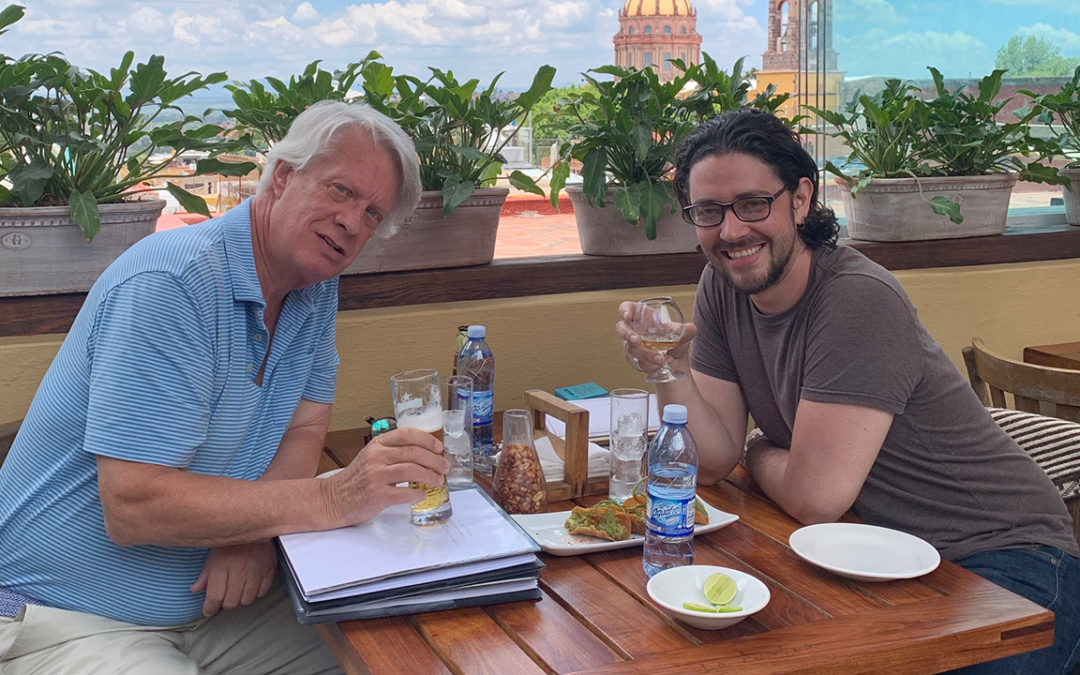
by Robert Bowie, Jr. | Mar 22, 2022 | FringeNYC, General, ONAJE, Operetta, Personal, Plays, Travel
Last Friday afternoon I took the train to New York for the sole purpose of seeing Christian De Gré Cardenas for dinner. The following morning I took the train back home to Baltimore. The only reason for that trip was because he is a friend I just had to see.
It was also a very personal post-Covid-lockdown tip of the hat to celebrate my belief that change is a gift from God.
After my first career as a business trial lawyer I decided I wanted to enter the professional world of theater in New York City, if I could in my late 60s and early 70s.
The only way to get across a chasm so deep was to jump.
Because I was old and no one would read my scripts, I decided I had to take an alternate approach. I decided to use my background as a lawyer so I read all the legal contracts required to be a producer and I took a class in producing theater.
All the young future producers started to ask each other what they wanted to produce. When it came to me I would say: “Nothing. I want you to produce me.”
After I had taken an introductory class at the Commercial Theater Institute in New York, I got a chance to go to the O’Neill Conference in Waterford, Connecticut for an advanced class so I could meet the future big shots.
That trip was a life changer. I hit a gold mine. I met three people within 24 hours who would change my life forever and are my friends to this day: Christian De Gré Cárdenas, Sue Marinello, and Aaron Sanko.
Today I want to talk about Christian and how he has changed my life for the better.
We both got off the northbound train from NYC in Connecticut in the early evening. We were picked up by a van driven by Aaron Sanko, who transferred us to a small motel where we would stay during the conference.
Aaron and Christian knew each other from the New York theater world. I was the old guy in the backseat who didn’t know anything or anybody who had instantly become a groupie.
The next day, Christian and I would be in the same class with Sue Marinello, and we have been bound together with Aaron Sanko ever since. I will talk more about these, my collaborators and friends, as we approach the opening of Mind The Art Entertainment’s (MTAE) upcoming performances, which will be premiering in April, July, and November in New York.
When Christian and I got off the train we looked like two Willy Lomans walking on stage in Death of a Salesman. After we were delivered to the motel and were waiting to register, I decided to talk to Christian and asked him if he would like to go get a drink after we checked in. He never got a chance to answer because the night clerk interrupted to tell us: “Forget about it. Everything is closed.”
Sue Marinello and I sat next to each other at the conference, and she committed to reading my play Onaje. Shortly thereafter, Christian suggested we apply to the upcoming New York Fringe Festival.
After the remarkable success of Onaje, Christian offered me a chance to write Vox Populi, his final operetta in a series based on the seven deadly sins. I immediately accepted and we agreed to meet at a restaurant in Spanish Harlem next to his apartment, where we would sketch out the plot and talk about the tone and temperature of this comedic operetta.
We had the restaurant to ourselves and the waiters brought us food and mescal throughout the afternoon, until the restaurant was set up for the dinner crowd to come in. It was magic.
I went back to Baltimore and went to work at a feverish pace and completed a rhyming rollicking first draft that Christian liked. He invited me to go to San Miguel de Allende, Mexico, to marry the music to the words.
Each morning we would get up and go to a little breakfast place that had a wide open garden with a little pond, a beautiful flowered fence, and a balcony with tables for breakfast. We were often alone as we started our day of work.
During breakfast we would go page by page editing the draft, and in the afternoon Christian went to work writing the music while I made changes to the script. Later in the afternoon, Christian would play back the music he had created. In the evening we went to magnificent restaurants in San Miguel and drank more mescal.
Around the plaza and the magnificent church, mariachi bands would sing for the locals, as well as the tourists, and we would walk the streets and listen for music coming from the rooftops. When Christian liked the sound overhead we would enter, go up the stairs, order another drink, and listen until we moved on to the next venue. It was magic.
When we got home at night Christian would go back to work, and in the morning, before we went to breakfast, he would play back what he had composed the night before.
This routine went on for well over a week and somewhere during that time we became brothers in creativity and laughter, and deep friends.
It is amazing how we all step in and out of unique worlds as we change careers or grow older. In my case, as my second career evolved and as I grew older, I stepped into an amazing world of people and experiences that have made me richer and more fortunate.
Unlike any profession I know of, the theater welcomes humanity into an opportunity for friendship in a way somehow the world cannot achieve.
During our dinner in New York last Friday, we were talking about something but I can’t remember what. I just remember Christian looking up straight into my eyes in a moment of surprise and saying: “Do you realize I am exactly half your age?”

by Robert Bowie, Jr. | Feb 15, 2022 | Featured, Man Machine, Personal, Plays
About a week ago, I could take COVID-19 and its variants no longer. I couldn’t do Netflix anymore. I needed community.
A long time ago, I decided that what makes theater a community — and Netflix not — is the interactive energy of a live audience. But I had a problem now.
If I were to go to live theater now, I would be breaking a promise that I had made to myself almost two years ago.
It was during our final table read of The Grace of God & Man Machine. I had paid no attention to talk of some virus in China. Mind The Art Entertainment had committed to produce my play and soon we would be opening off-Broadway.
That night I bought a steak, a glass of wine, and a single ticket to see Hadestown on Broadway in front of a sold-out audience. Hadestown would provide me that same energy that I would soon be part of when my play would go live off-Broadway.
I was beyond happy.
The next day as I took a train back to Baltimore, I realized something terrible was happening. Pretty soon thereafter, theaters started to close and slowly an unconscious darkness opened in me.
My hope of a second life as a playwright, which I had dreamed of even as a boy, so unfairly started to drift away, week after week and then month after month. But more horrible was the loss of not being a part of live theater.
I made the promise, and over the months I hardened my resolve, that I would not go to the theater until I could be part of that collective energy. I refused to settle for some anemic second-best with half-empty seats.
So why did I nonetheless decide last Wednesday, February 9th, to go to a new play: Behold, A Negress by Jacquline E. Lawton, at Everyman Theatre in Baltimore? Why was I breaking my promise when the theaters were not fully open?
What was it, really, that I so desperately missed?
I chose to go to Everyman Theater because it always has been a theater bustling with people and when the lights went down every seat was always filled with a loyal subscription audience. I had been going there for opening nights for over 30 years. I could count on them. Somehow, they could always seem to deliver that energy.
The day before the performance I received a phone call reminding me that I must bring evidence of my COVID vacations and booster and wear a mask the entire time I was in the theater. I confirmed that I had gotten all the vaccinations and would be wearing a mask.
It seemed to foreshadow my disappointment and to add salt to the wound.
When I entered, I had my mask on and my vaccination records ready. An assistant at the door checked off my name.
I noticed the list was not extensive.
As I entered the lobby it was strangely quiet. There was no familiar group of chatting people lining up for a glass of wine before the performance.
When I entered the theater, even after social distancing there were a lot of empty seats.
I looked around and there was a pit in my stomach. This wasn’t going to work.
Before every theater performance, I have a ritual. I observe the set and the stage and try to imagine how different it will be when I look back at it after the play is over and the actors are taking their bows.
I looked at the set and then gave it a second look. I was intrigued by how perfectly it had been designed and how beautiful the high ceilings and colors were in a post-revolutionary Paris drawing room and how carefully an artist’s easel had been displayed upstage center.
The set alone had caught my attention. It felt good. I had inadvertently crossed the threshold and now I did not want to be disappointed.
The lights went down. The music picked up and the play began.
The first of the two lead characters enters in a stunning dress and without a word, in a minute, establishes her character though action alone. The second lead enters, also in a stunning period piece costume, to establish her character and the framework of the play with minimum exposition. I was hooked.
Artfully, everything was in place.
I will give nothing away other than it was a 90-minute play with two principal actors and one supporting character. The two leads reveal a multifaceted relationship through many artful twists and turns and even briefly use dance to create the excitement of creating a portrait to change the political mind of Paris.
The play itself is about the character it takes to risk one’s self and one’s art form to save the moral authority of a culture.
Wasn’t that what this theater was actually doing by performing this play at all?
Slowly, something wonderful and unexpected rose up in me as I looked back at that stage as the actors took their bows before a small but very enthusiastic standing ovation.
It was pride, and then deep respect for this theater that would protect its patrons but also not compromise the quality of any aspect of a magnificent production, despite the cost.
It was that but there was also something else.
What was this unique little community?
The actors playing the roles, the director and tech professionals creating the atmosphere, and the willing suspension of disbelief and presence of the audience?
Then I laughed.
No other community would have a catchphrase as its answer: “The show must go on.”
I had foolishly demanded the fiction of perfection and had missed the perfection of the thing itself.
I left laughing and looking forward to rejoining this little community of feral souls who create, with a live audience, the sustaining vision for its larger community, by example.
November 22, 2022–December 20, 2022 at Theater Row, 410 42d street NYC, The Grace of God & The Mind Machine will finally open.
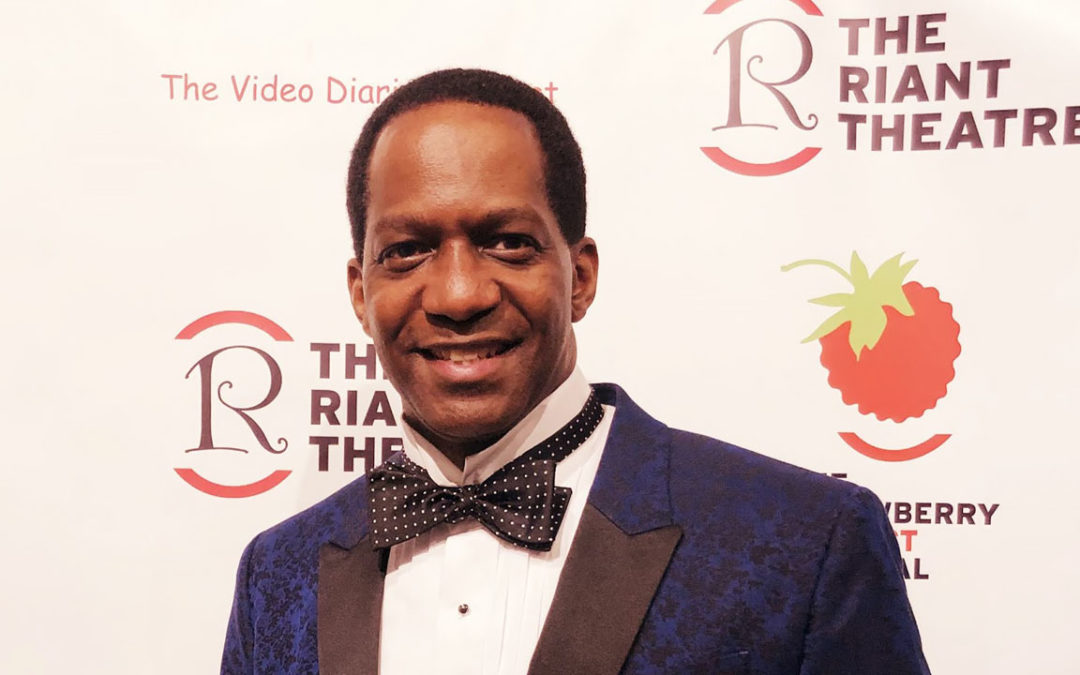
by Robert Bowie, Jr. | Oct 12, 2021 | Featured, Man Machine, Plays
Six months after the pandemic shut the New York theaters in March of 2020, I met a remarkable man, Van Dirk Fisher on an introductory Zoom call.
He had chosen my play, The Grace of God & The Man Machine, for a virtual performance at The Riant Theatre.
From the start, I was skeptical about a virtual performance, but I was impressed by Van’s tenacity and remarkable creative energy.
He would not let me say no. Less than a month after that call — and a year ago this October 25th — Van directed a highly creative virtual performance of the play.
The producers and I watched him direct the brilliant cast he had assembled and shape the virtual performance. He completely understood the play and he almost seem to inhabit it.
The following Tuesday after the performance, I dedicated a blog to him. I said:
This new format was advanced by a remarkably effective merger of the immediacy of live theater and the dramatic impact of the cinematic closeup.
Director Van Dirk Fisher and the Riant Theatre placed virtual backdrops behind the actors and the actors, all separated and in some cases in different states, reached out and past a joint between each other and exited and entered as they stepped in or out of the camera in front of which they performed alone.
The reading took on an immediacy that a staged reading cannot provide, but the degree of difficulty remained almost unnoticed for an audience which tuned in from New York to California.
Judging from the chat rooms and the talk back after the performance, it was a huge success.
The producers were so impressed by what they had seen they immediately bet the farm and asked him to direct the future off-Broadway production.
We had only met him in Zoom meetings. He was that impressive.
Last Friday, nearly a year later, finally I received a text from the producer telling me it would finally happen. The Grace of God & The Man Machine would open this spring off-Broadway. We were off and running and finally we would be working with Van in person.
Two days later I was surprised by a text message from Van‘s sister:
“Van passed yesterday at 3:49pm.”
When I called her in disbelief, she told me December of last year, he had been diagnosed with stage four stomach cancer but had fought it and continued to work.
A month or so ago, I contacted him to see if he was interested in working on a new play. He never revealed that he was sick.
Just as American theater is opening up and finally recognizing Black creators, this man and his future audiences will be deprived of his chance to show his considerable gifts.
I would be willing to bet that up until the very end, he believed he was going to beat cancer because that’s who he was.
When this play goes up off-Broadway, there will be a tip of the hat in the program to him and his indomitable spirit.
I only knew him through Zoom calls but now he won’t even be there for us virtually. I never got a chance to meet him and shake his hand but I know he will be there with us when the play opens.
He will be with us live!
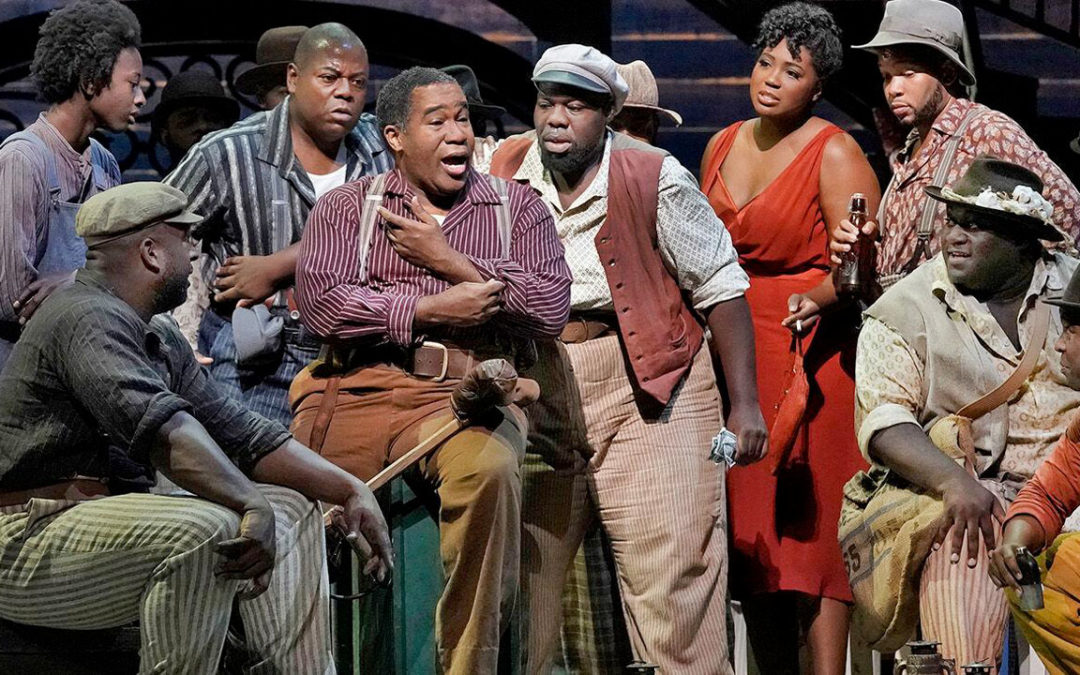
by Robert Bowie, Jr. | Sep 21, 2021 | Featured, Plays
Let’s first be grateful, and then let’s take this apart piece by piece.
Last Sunday The New York Times theatre section reported that seven plays by Black authors would open on Broadway this fall: “Chicken & Biscuits,” “Trouble in Mind,” “Lackawanna Blues,” “Clyde’s”, “Skeleton Crew,” “Pass Over,” and “Thoughts of a Colored Man.”
Broadway’s pre-pandemic theater season featured two plays by Black authors. The previous season, there had been just one play and in the season before there had been none.
All seven plays in varying degrees have been time tested off-Broadway, whether it be recently or in the past. They are all interesting and worthy based on their past history and past reviews. With the exception of Lynn Nottage, who is a two-time Pulitzer Prize winner, they all offer new voices about the human condition.
The article wondered whether this trend to welcome Black authors would continue. The fear is that Broadway’s traditional white audiences would not attend these plays and thus they might fail financially.
Historically, something like only one out of five Broadway plays ever recoups its expenses.
To produce a play on Broadway is extremely expensive. The New York Times article reported: “According to filings with the securities and exchange commission, ‘Thoughts of a Colored Man’ is costing up to $5 million to mount; ‘Chicken & Biscuits,’ up to $3.5 million; and ‘Pass Over’ up to $2.8 million.”
Also, it would be easy for those who want an excuse to blame the lack of attendance of Black audiences. The Times reported: “In 2018-19, 74 percent of theatergoers were white, and 4 percent were black, according to a demographic report by the Broadway League, a trade association representing producers in theater owners.”
Theaters rely heavily on tourists for ticket sales and all these plays come to Broadway under the threat of the pandemic.
But this may not be an appropriate way to measure success or failure for these plays or their authors.
If these seven plays and their authors do not succeed according to Broadway standards, they will nonetheless have received the blessing of the Broadway brand and will have the afterlife and influence of future performances in one of more of the 74 regional theaters in 29 states and the District of Columbia.
Regional theaters rely more on seasonal subscribers who love theater and remain more open to new works, particularly if they have been blessed with a Broadway production.
Everyman Theatre and Center Stage in my hometown of Baltimore have regularly contributed to putting on such a new works, but now it will be safer for them to continue doing so.
For these playwrights, this new visibility will offer a brighter future for their future works.
Of course, the greatest benefit is for us, the theater-going public, because these new playwrights will finally be able to introduce new stories from a different perspective about our human condition.
Theatre is different than almost any other art form in the way it communicates and has impact. It is a staged conversation which is also a conversation between the stage and the audience. It is powerful because it is intimate and live.
Perhaps these are the conversations that we have been unable to have in a polarized country.




